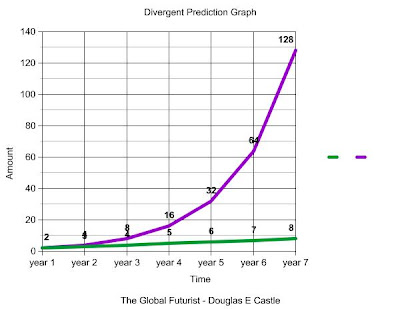In my most recent post about using simple linear extrapolation as one of many possible tools which could prove useful in forecasting and preparing for certain events, I'm afraid that I made the terrible mistake (it isn't my first, and will not be my last) of failing to issue a whole roster of circumstances where this approach would not be ideal (if applicable at all), with an accompanying list of limiting parameters where this approach might certainly need to be adjusted significantly if not discarded altogether.
My intention [and perhaps the road to Hell is paved with good intentions] was to cite one very simple approach to discerning a trending pattern and where it might lead. I apparently mislead at least one reader into believing that I thought that linear extrapolation was the absolute best means to make predictions. Now, I hang my head in shame. The linear extrapolation approach to predicting the future has the following limitations, to state just several of a vast number:
1) It assumes a constant (linear) rate of growth or decline over time, which is seldom the case -- the patterns of history do not necessarily repeat themselves, rates of growth and decline are subject to variation, as are many other items. These factors may render our initial projection assumptions invalid;
2) It does not provide for changes in technology, resource availability, demand, competition, regulation, obsolescence, economic markets (fundraising, the cost of capital, the money supply, interest rates, and the like), natural disasters, amazing breakthroughs or the intervention on the part of the futurist making the prognostication in influencing the results via a mechanism correlative with the notion of a self-fulfilling prophesy;
3) It does not provide for limited markets, holding capacities, or changes in either of these.
In a comment that I received regarding my now infamous post, Xamuel (whose insightful quote is printed below, unretouched) set me straight. Both The Global Futurist and Douglas E Castle humble ourselves before you, and apologize for misleading any of our readers. We also offer our sincere thanks for having this pointed out to us and our readers. Your input, negative, positive or neutral, is welcomed and encouraged. We learn from our mistakes.
---------------
- Linear extrapolation might work sometimes in, say, climatology. It's not going to predict the future worth a hill of beans, though. It completely misses any revolutionary new development-- by its very nature! Even besides that, it has a bad habit of ignoring holding capacities (say), and predicting (e.g.) that a sample of bacteria will rapidly fill up the entire universe. Although I have been told never to make generalizations, I will take exception with this advice with reference to Futurists (and those people who love them): There is no single method for prediction. There are many approaches, but each has its own inherent limitations. My approach to drawing a futurescape involves a great deal of imagination, a great deal of data collection, and a combination of a large number of approaches, each with its own respective strengths and weaknesses.
- Sadder still is the fact that unpredictable events happen during the course of the extrapolation period (which makes any forecast a moving target) which cause a need for us to re-evaluate our assumptions and our methods to be changed dynamically. Forecasting requires constant monitoring, adjustment and correction for the effects of reactive intervention or interference, self-fulfilling prophesies, and other recursive variables that blur the line between predicting the future and causing the future.






